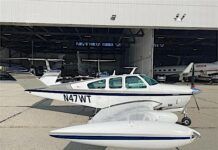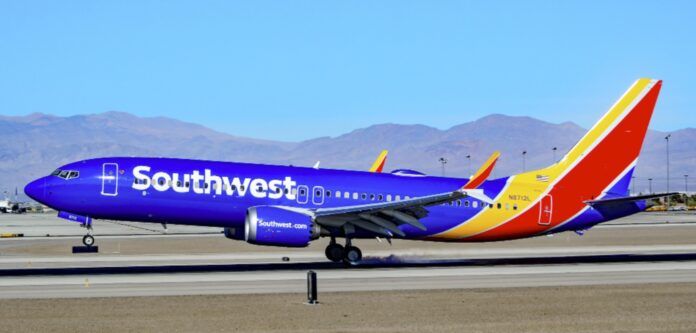Attorneys pursuing a lawsuit against Southwest Airlines posted a legal filing accusing the airline of an unusual certification maneuver they say was designed to deceive the FAA. A Seattle Times story published Monday (May 16) reported that, in 2016, before the 737 Max was certified, Southwest management suggested that Boeing install a single example of the new model’s flight-control warning system on one of the airline’s existing 737-800s, then remove it once the new Max variants were certified.
The class-action lawsuit is filed on behalf of Southwest customers who bought tickets on flights flown on Max models between the first high-profile crash in October 2018 and the second in March 2019. The suit alleges that Boeing and Southwest concealed safety defects on the Max to increase demand for air travel, and as a result, those passengers paid higher prices for their tickets.
The ongoing legal action, begun in March, maintains that the intent of the warning-system maneuver was to communicate to the FAA that the system was not “new” on the Max. If successful, the strategy could have avoided costly training for pilots on the new aircraft, according to the Texas attorneys.
According to the Seattle Times story, Mary Schiavo, former U.S. Department of Transportation Inspector General, said, “It’s hard to come up with any reason for that other than to deceive the FAA.” In an interview, ex-Boeing engineer Rick Ludtke, the designer of the new system, talked about the Southwest proposal and how some Boeing managers discussed prospects with him for implementing it. “We laughed at them,” said Ludtke. “We thought they were nuts.”




































Maybe I’m not getting it, but if the extent of the damages is the difference between “regular” ticket prices and “higher” ticket prices, how much does each participant in this lawsuit expect to realize from a favorable judgement?
Can’t tell, but it looks like SWA conspired to keep passengers happy and wanting to fly. I think the lawsuit is saying thta keeping passengers happy and wanting to fly keeps ticket prices higher than keeping passengers in fear of flying.
Lawyers… that is who plans to win here.
These class-action lawsuits are not about the damages the individual participants might realize, they are about the legal fees that the lawyers will collect. Typically the legal fees are 33%-40% of the total, so $10 damages for each of 50 million passengers adds up to a nice payday for the legal team. It’s quite possible the passengers’ damaged will be paid in the form of Southwest discount coupons, but you can bet the lawyers will get cash.
Class action lawsuits enrich lawyers, not the victims.
Absolutely correct, Laurence. In normal litigation the amount that the attorney or law firm receives is often capped. However, in class action suits, there are no caps so they can bill whatever they choose. I’m sure I will hear a response from an attorney on that comment, but the law firms hope for an out of court settlement. That way, there is little oversight on their fees, which come out of the total settlement before any funds are distributed to the plaintiffs. The last time I was involved in a class action suit against an airline, the law firms got tens of millions in fees and I got a coupon good for $50 off my next ticket on that airline.
Exactly. Nothing to do with safety, nothing to do with helping the people that lost money… this is for the lawyers, and no one else.
Remember that if ever put on a jury… award $1
But did SWA understand that the system had morphed to complex?
Perhaps SWA were trying what they understood MCAS to be.
Remember that MCAS started out as a simple stick nudge like the KC-46A and the 707s for UK approval have. But it morphed to aggressive, and that morphing was not well communicated – indeed some Boeing people seemed to not grasp it, Boeing failed to revise safety analysis.
Does Schiavo lack imagination?
Mary Schiavo is an enemy of aviation.
The FAA is a tombstone agency. Someone dies for every regulation. Without the I.G. looking over their shoulder, there is an agency run by the airlines. Even now, there is too much airline management interference in the FAA. When Mary Schiavo was the I.G. she was correct in identifying dangerous practices happening at the airlines which negatively impacted the public. With MCAS Boeing “stepped in it” *& it morphed into something that had no business on a Boeing. The FAA has been led down a path with the 737 that shows the footprints of big business in the aviation world & to the detriment of the public it is supposed to serve.
It seems to me, that in order for this lawsuit to be successful, the plaintiffs will need to convince a jury that the FAA is easily “deceived” by such a “maneuver”. Something tells me the FAA won’t take that kind of talk sitting down.
Before you file this in the frivolous lawsuit trash can read the full article in the Seattle Times. Southwest was willing to do, and did, almost anything to avoid any type of training requirement before their pilots could fly the Max. The lawsuit might be frivolous but the information it uncovered is very damning to both Southwest and Boeing.
Damming how? It was explicitly stated by and to everyone concerned right from get-go that the MCAS was conceived and structured to fix the pitch-up problem in a way that would not require recertification of the huge 737 pilot base. There wasn’t anything underhanded about it.
For the past 20 years, every time I see or hear Mary Schiavo touted in the media as an **Aviation Expert**, I know I can safely tune out the rest of the story, since if they had to dig up this fossil it means the reporter can’t find someone actually qualified to comment and there must really be no substance to the story.
Of all the Talking Heads of supposed subject matter experts that the media drags out of their dungeons to comment on aviation, she wins the prize for both lack of qualifications and ability to smugly pontificate in a good vs. evil way that even a child would realize is over-simplified. I have to admire someone who made a career of turning her brief federal “service” into an endless cash stream of ill-informed media shilling and for-pay “expert” testimonies.
She was an IG at DOT decades ago. In my experience working with dozens of them, An IG at a federal agency doesn’t know anything about the work of the agency. They generally have some auditing experience but know nothing about the subject matter, and since they are adversarial and in their own reporting chain, no one at the agency will bother to try to educate them. So they just basically pretend they know what they’re talking about and don’t seem to feel any shame in it. IGs work independently from their agency hierarchy and report to no one; their only bounds are that they are required to produce a certain number of audits each year.
To meet their quota, they dutifully sniff around for 6 months and produce a 20 page report of “duh” exposes that any person off the street already knows.
Google “FAA OIG” and have a look at their current shocking revelations like their most recent report: “FAA Made Progress Through Its UAS Integration Pilot Program, but FAA and Industry Challenges Remain To Achieve Full UAS Integration” – Wow, “challenges remain”?, hey I think everyone knew that, but thanks for the report. Or how about the previous shocker from March : “While FAA Is Coordinating With Other Agencies on Counter-UAS, Delays in Testing Detection and Mitigation Systems Could Impact Aviation Safety” – who knew it “could”?? what a controversial takedown!
I am actually all for controlling federal fraud/waste/abuse, but unfortunately no IG seems to have either the skill or will to actually do the work to understand what’s really happening at their agency and where all the money is really being wasted, so every year, they writeup a few jaywalkers while there’s a severed head right in front of them. Surely, those last two reports are not what needed investigating at the FAA.
Ms. Schiavo’s time at the FAA was brief and of little consequence, and she objectively lacks any discernable industry qualifications, but her ability to put her face on so many aviation media stories (and be a paid consultant for trial lawyers) year after year, is nothing short of amazing. What a country!!
During my career with the Marines, we had numerous IG types on various issues. Mostly, I found civilian folks who were never in the military, never served other than a post with IG, and actually didn’t know a damn thing about Military Aircraft.
I ended up educating them on how we operated and conducted flight operations…. so on-so-forth. The lack of awareness on some of their parts was comical. During one of the so-called Inspections, I turned the gent over to one of our Corporals (an enlisted rank of E-4.) Smitty, as he was called actually ended up educating so the called expert Inspector General.
Mark Phelps, I would suggest the next time you write an article you find a more qualified individual besides the Inspectors General’s office.